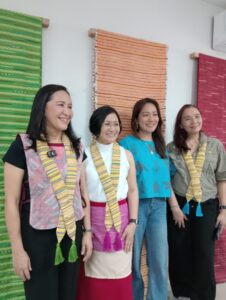The Quezon City government launched the country’s first textile circularity hub in Payatas on Thursday, a facility that processes discarded fabric into high-value products, tackling the worsening textile pollution while providing livelihoods for the local community.
The facility is called the QC-Anthill Circularity Hub and it is strategically placed in the Payatas Controlled Disposal Facility (PCDF), once known as a garbage dump, but has been transformed into an ecological park.
“Textile waste is often overlooked, but it’s one of the fastest-growing types of urban waste,” Mayor Maria Josefina “Joy” G. Belmonte said during the launch event.
“Through the Circularity Hub, we’re proving that sustainability can be both creative and empowering.”
The facility was made possible through a public-private partnership between the city government, Anthill, a Cebu-based social and cultural enterprise, and the Pilipinas Shell Foundation.
Other organizations, such as the Maybank Foundation and the Association of Southeast Asian Nations (ASEAN), will also support the development of artisans’ skills
Anthill’s co-founder, Joy Anya Lim, said that 20 artisans from Payatas will undergo a three-month-long training program with daily compensation.
After the training, ten of the artisans will proceed to a six-month probationary period, after which they may be absorbed as full-time employees of the facility.
“We are not just promoting sustainability by removing this waste, but we’re also providing a sustainable livelihood for these women, most of whom are mothers,” Ms. Lim told BusinessWorld in mixed English and Filipino.
“Most of them earn very little from making rags, but now they have a better chance of earning more,” Ms. Lim also said.
The Bureau of Jail Management and Penology is also set to support the hub by allowing Persons Deprived of Liberty (PDLs) to sort textile waste that will be used by artisans.”
Quezon City Mayor urged more brands and businesses to support the hub’s circular initiative, such as donating their textile waste to the hub or having clothing made at the hub instead of buying it overseas.
“We call on our business community, especially those based in Quezon City, to explore how textile circular solutions can be part of your supply chains,” Ms. Belmonte said.
“Let’s work together to upcycle textile waste and turn it into something useful, so we can help build a greener and more responsible city,” she added.— Edg Adrian A. Eva
